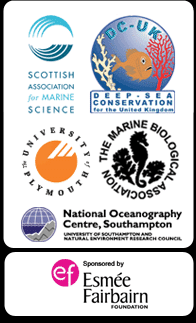 |
|||
|
Partners: SAMS, Scottish Association for Marine Science (www.lophelia.org) NOCS, National Oceanography Centre, Southampton (www.DeepSeascape.org) |
|

|
|
 All rights reserved. Launched 01/09/05 |
Deep-sea UK modules Via the project modules below, the DC-UK Web site will give access to the most comprehensive and up-to-date deep-sea information resource. Biodiversity - (www.lophelia.org) Biodiversity Think of coral reefs and you imagine warm, shallow tropical seas - not the cold, dark waters of the deep ocean. Now the deep ocean's best-kept secrets are being revealed - ancient coral ecosystems hidden from view at great depths. Lophelia.org is an information resource on the coral ecosystems of the deep ocean. Vessel Monitoring system Deep-sea ecosystems are very poorly known but are increasingly affected by offshore human activities such as oil and gas extraction and increasingly deep-water fishing. Deep-water trawls can cause major damage to habitats that are 1000's of years old. With the advent of deep-water Marine Protected Areas such as the Darwin Mounds off Northwest Scotland, it is important that suitable measures are in place to police these areas properly. Current methods employ a combination of spotter planes, naval vessels and onboard observers to monitor deep-water Marine Protected Areas, none of which are 100 % effective. From January 2005 all EU vessels have been required by law to carry satellite Vessel Monitoring Systems (VMS), which transmits positional data of fishing boats. At present these data are collated by each member state for the control and surveillance of fisheries, but are not widely used for habitat protection. VMS offers huge potential as a tool for spatial management, helping to conserve precious deep-water marine habitats (Hall-Spencer, 2002). In our study we are investigating the use of VMS data around the Darwin Mounds and around Rockall , a heavily fished area to the west of Scotland. Britain's undersea landscape Click here to explore the Web site of the National Oceanography centre at Southampton.
|